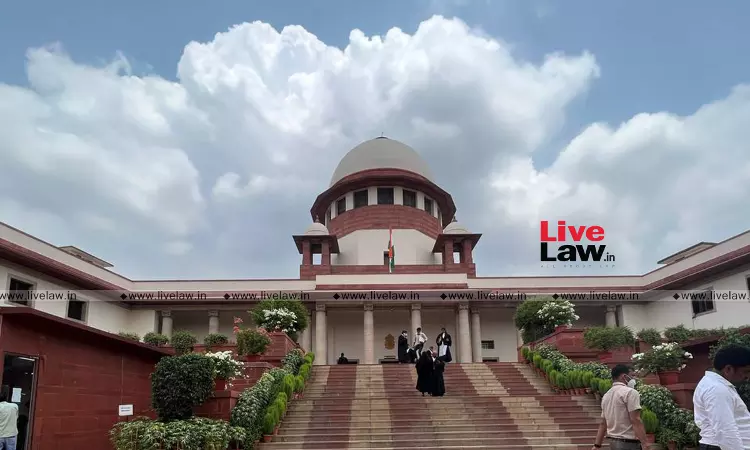17 Months Delay In Delivering Judgment : When Supreme Court Ignores Its Own Directions To Pronounce Verdicts Promptly
Awstika Das
6 May 2023 10:31 AM IST

Notably, SC has issued guidelines before to ensure prompt adjudication by high courts after the conclusion of arguments.
The Supreme Court on May 4 decided to set aside an order by a magistrate in Kolkata directing a police investigation into an allegation of gang rape and criminal intimidation against Bharatiya Janata Party leader Kailash Vijayvargiya and others. Interestingly, the top court, which has in the past issued guidelines to ensure prompt adjudication by high courts after the conclusion of arguments, delivered this verdict almost 17 months after reserving it.
The BJP national general secretary and two others have been accused of raping a woman and threatening to kill her and her son. When the police reportedly refused to lodge a first information report against Vijayvargiya and the others, she sought the intervention of a city magistrate. However, on the Chief Judicial Magistrate, Alipore declining to entertain her application, the complainant had to approach the Calcutta High Court. The high court granted her relief by allowing her criminal revisional application and remanding the matter to the magistrate. It is this order that the three accused challenged before the apex court. In a significant development, during the pendency of the special leave petitions, the magistrate in Kolkata accepted the complainant’s application and directed the police to treat it as an FIR and initiate an investigation into the allegations of sexual assault and criminal intimidation.
Now, the top court has set aside the order passed by the magistrate on remand, saying that there had been no independent application of mind. The bench of Justices MR Shah and Sanjeev Khanna have also directed the magistrate to consider afresh the issue of whether an FIR needed to be registered against the accused in this case, by applying their ‘judicious mind’. This verdict was reserved on December 12, 2021 and was pronounced on May 4, 2023.
In light of this delay of nearly 17 months in delivering the judgement, the question that begs to be asked is whether the top court itself is free of the shackles of the self-imposed restraints that it asked the high courts to be bound by, as early as 2001. While adjudicating on a case in which the Patna High Court’s verdict came two years after the conclusion of arguments [Anil Rai v. State of Bihar], a bench of Justices KT Thomas and RP Sethi had issued a set of guidelines on the timely pronouncement of judgements “to be strictly followed and implemented” by all high courts. Among these, were directions allowing parties to file an early judgement application after the passage of three months since the conclusion of arguments, and an application to the chief justice for a fresh hearing by another bench if the judgement is not pronounced within six months.
In another case, there was a hiatus of nine months between the Bombay High Court pronouncing the operative portion of the judgement and finally disclosing the underlying reasoning. “This cannot be countenanced. Judicial discipline requires promptness in delivery of judgments,” an apex court bench of Justices Sanjay Kishan Kaul and Hrishikesh Roy said, taking strong objection to the delay.
The Supreme Court has objected to an inordinate delay between the pronouncement of a judgement and it being uploaded on the high court’s website. Again in 2022, the top court rapped the Allahabad High Court bench for publishing the final judgement four months after dictating the operative portion in court.
In July of last year, the top court again chastised the Allahabad High Court for delivering a judgement six months after reserving it. Justice Shah himself was heading the bench that, while setting aside the decision, observed that it was ‘advisable’ for the high courts to pronounce judgements at the earliest after the arguments are concluded.
It can be argued as the apex appellate authority – the crown jewel of the Indian judicial architecture – the Supreme Court should be allowed more time before handing out irreversible (mostly) verdicts which would put a quietus to the litigation. And that argument is not unreasonable or unfair. But, if that is the case, and there is a different standard to be applied to the top court, it must be clarified post-haste.
India is home to over 140 crore people, living in 28 states and eight union territories. To administer justice to them, we have a Supreme Court, 25 high courts, and innumerable local courts with different jurisdictional remits. Despite the elaborate web of judicial fora in the country, owing to the enormity of the population of beneficiaries, one of the most persistent problems plaguing our judiciary is that of pendency. Taking the adage – ‘justice delayed is justice denied’ – to heart, the Supreme Court has in a catena of cases championed the right to speedy justice, not just to prevent injustice to the people, but also to guarantee a reduction in the volume of litigation pending in the judicial dockets. Time and again, it has rebuked courts subordinate to it for keeping the fate of litigants hanging in the balance for longer than necessary. It has issued guideline after guideline to guarantee speedy justice to the people of the country. But, what are the rules of the game when it concerns the apex court itself? Who will guard the guards themselves?
A quote from a 2008 judgement of the Supreme Court in Common Cause vs Union of India is apropos :
“When other agencies or wings of the State overstep their constitutional limits, the aggrieved parties can always approach the courts and seek redress against such transgression. If, however, the court itself becomes guilty of such transgression, to which forum would the aggrieved party appeal? As the ancient Romans used to say “Who will guard the Praetorian guards?” The only check on the courts is its own self-restraint.”


